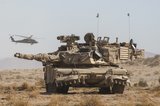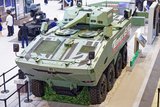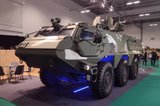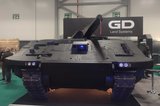CAR rebels rearm after military gets Russia weapons
Russia's supply of weapons to the Central African Republic's (CAR) military has sparked an arms race, with rebels turning to traffickers in Sudan for fresh gun shipments, according to a UN panel of experts.
In a report released on 31 July, the panel said the UN-approved deliveries of military equipment to CAR's defence forces had ‘led to waves of rearmament’ by some factions of the former Muslim Seleka alliance.
The rebel factions ‘believe that the government is preparing for a war against them,’ said the report sent to the Security Council in the week of 23 July.
In December 2017, the council approved Russia's request to send light arms to build up CAR's armed forces which are being trained by the European Union as part of an effort to restore stability to the country.
Nine aircraft landed in Bangui in late January and early February to deliver the Russian weapons and ammunition, which are being gradually distributed to trained forces in the capital and beyond.
The CAR exploded into violence following the 2013 overthrow of longtime leader Francois Bozize, prompting France to intervene with its Operation Sangaris.
The UN peacekeeping mission known as MINUSCA was deployed in 2014, but the country remains overrun with militias, many of whom claim to protect Christian or Muslim communities.
The report, which reported a ‘hardening of the positions’ of those groups, said: ‘The recent acquisition of weaponry by the government has created an incentive for the active rearmament of ex-Seleka factions.
‘Armed group elements told the panel that, since the government had opted for the military option (training, rearming and attacking) instead of the political process, armed groups needed to be prepared.’
After Sudan moved to disarm rebels in Darfur, Seleka warlord Abdoulaye Hissene ‘reactivated his connections with Sudanese individuals eager to sell their weapons,’ said the report which covers the January to July period.
Since January, there has been a growing number of reports of arms-trafficking with former Seleka fighters ‘increasingly seen carrying pistols and AK-type assault rifles’ in CAR's far-flung provinces.
The panel received information in April that the rebels had obtained Sudanese weapons including AK-type assault rifles, machine guns and ammunition and that ‘new weapons deals were being concluded’ with the Sudanese traffickers.
Sudan's government said in a statement released by its embassy in Bangui in May that ‘the presence of mercenaries of Sudanese nationality within the ranks of armed groups has nothing to do with the Sudanese government.’
After initially resisting the government's appeals for military aid, the council agreed to grant exemptions to an arms embargo to allow Bangui to build up its army and defence forces.
In June, CAR's defence minister asked a UN sanctions committee to allow deliveries of Chinese weapons for its national forces, but France, Britain and the US put a hold on that request, citing concerns over the proposed shipment of anti-aircraft weaponry.
Despite the train-and-equip effort, the army, known as the FACA, ‘currently has insufficient capacity’ to carry out operations ‘without the substantive and constant support of MINUSCA and/or the Russian instructors,’ said the report.
The panel noted that an African Union initiative for peace talks in CAR ‘has achieved some traction’ and that a Russian national appointed as President Faustin-Archange Touadera's security adviser had met with rebel leaders.
It warned that a lack of coordination with the African Union peace drive ‘could be counterproductive, as it sends mixed messages to the armed groups.’
More from Land Warfare
-
![World Defense Show 2026: Saudi Arabia’s record defence spend highlights uncertain times]()
World Defense Show 2026: Saudi Arabia’s record defence spend highlights uncertain times
Saudi Arabia’s investment in its land forces, notably in the area of air defence as recently as 30 January, is a sign of the challenges the Gulf State faces, particularly the threat from Houthi rebels in Yemen.
-
![Singapore Airshow 2026: ST Engineering’s Terrex s5 highlights hybrid power’s role in future warfare]()
Singapore Airshow 2026: ST Engineering’s Terrex s5 highlights hybrid power’s role in future warfare
Hybrid-electric drive technology may address the growing energy demands of land warfare in future.
-
![CAVS rides a wave and prepares for surge requirements as orders roll in]()
CAVS rides a wave and prepares for surge requirements as orders roll in
The Common Armoured Vehicle System is continuing to rack up orders as the British Army looks likely to become an operator of the vehicle, while Italy and Ireland are also contenders.
-
![US DoD task force’s DroneHunter acquisition lays groundwork for Replicator 2 CUAS strategy]()
US DoD task force’s DroneHunter acquisition lays groundwork for Replicator 2 CUAS strategy
As the US Department of Defense looks to counter the growing threat of uncrewed aerial systems to improve homeland security, the DroneHunter acquisition could point to future commercial innovation.
-
![Land forces review: Tanks, trucks and IFVs dominate but woes remain for Ajax]()
Land forces review: Tanks, trucks and IFVs dominate but woes remain for Ajax
This year has begun with main battle tanks taking the lead while orders for large logistics and support vehicles continued from last year. Additionally, two of the British Army’s most significant contracted vehicle programmes, Ajax reconnaissance vehicle and Challenger 3 tank, continued to make news in January.























